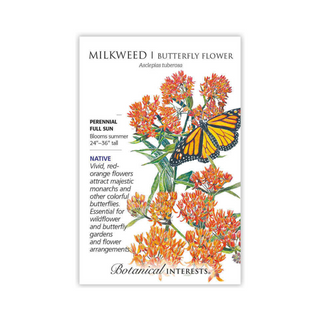
Description
Butterflies will seek out your garden when you grow this vigorous, heirloom perennial, a preferred nectar plant for monarchs and other pollinators. Beginning in summer, you will be treated to a profusion of fiery, red-orange flowers followed by decorative green seed pods. Drought tolerant once established; performs in poor soils. Native to much of the United States. A long-lasting addition to cut flower arrangements. Perennial in USDA zones 3 and warmer. Sap is toxic; avoid eye/skin contact and do not ingest.
Variety Info
- Family: Apocynaceae
- Native: Eastern U.S., Canada, and Northern Mexico
- Hardiness: Perennial in USDA zones 3 and warmer
- Exposure: Full sun
- Bloom Period: Summer
- Plant Dimensions: 24"–36" tall
- Variety Info: Individual flowers ½", borne in brilliant red-orange clusters.
- Attributes: Attracts Butterflies, Attracts Pollinators, Drought Tolerant, Deer Resistant
Sowing Info
- When to Sow Outside: 2 to 4 weeks before your average last frost date, or in the fall for spring germination.
- When to Start Inside: 6 to 8 weeks before your average last frost date.
- Days to Emerge: 14–28 days
- Seed Depth: ¼"
- Seed Spacing: A group of 3 seeds every 12"–24"
- Thinning: When 3" tall, thin to 1 every 12"–24"
Growing Info
- Harvesting: For longest vase life, harvest flowers in the morning, choosing blooms that are 1/2-2/3 open. Place in water, allowing the latex within the stems to dissipate in the water, then change the water. Wear gloves; milkweed sap can cause skin and eye irritation and can be toxic if ingested.
Description
Butterflies will seek out your garden when you grow this vigorous, heirloom perennial, a preferred nectar plant for monarchs and other pollinators. Beginning in summer, you will be treated to a profusion of fiery, red-orange flowers followed by decorative green seed pods. Drought tolerant once established; performs in poor soils. Native to much of the United States. A long-lasting addition to cut flower arrangements. Perennial in USDA zones 3 and warmer. Sap is toxic; avoid eye/skin contact and do not ingest.
Variety Info
- Family: Apocynaceae
- Native: Eastern U.S., Canada, and Northern Mexico
- Hardiness: Perennial in USDA zones 3 and warmer
- Exposure: Full sun
- Bloom Period: Summer
- Plant Dimensions: 24"–36" tall
- Variety Info: Individual flowers ½", borne in brilliant red-orange clusters.
- Attributes: Attracts Butterflies, Attracts Pollinators, Drought Tolerant, Deer Resistant
Sowing Info
- When to Sow Outside: 2 to 4 weeks before your average last frost date, or in the fall for spring germination.
- When to Start Inside: 6 to 8 weeks before your average last frost date.
- Days to Emerge: 14–28 days
- Seed Depth: ¼"
- Seed Spacing: A group of 3 seeds every 12"–24"
- Thinning: When 3" tall, thin to 1 every 12"–24"
Growing Info
- Harvesting: For longest vase life, harvest flowers in the morning, choosing blooms that are 1/2-2/3 open. Place in water, allowing the latex within the stems to dissipate in the water, then change the water. Wear gloves; milkweed sap can cause skin and eye irritation and can be toxic if ingested.

